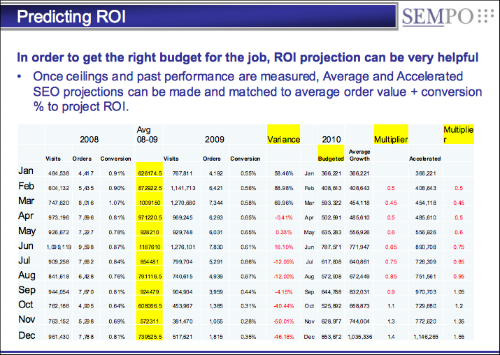 What good is great content optimization and social media promotion without meaningful measurement? This session at SES London focused on three different perspectives towards measuring performance which were as relevant to any online marketing as they were to Search Engine Optimization.
What good is great content optimization and social media promotion without meaningful measurement? This session at SES London focused on three different perspectives towards measuring performance which were as relevant to any online marketing as they were to Search Engine Optimization.
In fact, that notion of “SEO is Marketing” lends really well with the trend a lot of people are talking about in the online marketing industry. Many SEOs are building up more strategic skills and approaching optimization more holistically. Ironically, this is my topic next week at Search Congress in Barcelona so this session proved to be quite useful for a more holistic online marketing measurement perspective (with a SEO slant).
For this session at SES London, moderation duties were handled by Jon Meyer from Yahoo! and included Chris Boggs from Rosetta (Publics) who is also President of SEMPO, Kevin Gibbons, SEO Director at SEOptimise and Will Critchlow from Distilled.
Things started off with Chris Boggs:
For SEO, there are 3 primary areas to measure on:
- Technical: Pages indexed, server response, competitors.
- On-Site: Think of content holistically, not just HTML. Images, video and applications.
- Off-Site: Promotion and link building as well as social metrics.
The basics of SEO metrics involve traffic, such as brand vs. non-brand keyword referrers. Basics also involve conversions, which might include things like sales, leads, downloads, page views, etc – whatever outcomes are important to you.
Keep in mind to track everything at a macro level but make sure you’re also tracking at a business unit and category level. Why and when you should measure depends on your perspective:
Reactive Measurement:
- Loss of rankings and traffic
- Loss of onsite conversions
- Loss of phone calls, emails, etc
Proactive Measurement/Monitoring:
- A new competitor seems to be up in search visibility
- Algorithm update
- Industry shift
- Monthly reporting
Vertical SEO Measurement Nuances:
- Retail: Measure the quantity/variety of unique keywords being used to enter via organic search.
- Financial Services: Understand the interactions with Branch Locator or other destination pages. Measure user path through the site once entered through search to determine if they’re “qualified”.
- B2B: Understand the value of search positioning for part and model numbers as well as downstream traffic to other organizational domains.
- Healthcare and Pharmaceutical: Be aware of surfacing metrics which will help legal and brand marketers understand the need for deeper keyword optimization.
Measuring the Halo:

Calculating future SEO performance is a matter of art meeting science and as with many things related to SEO, there are many variables at play as well as unknowns. Chris shared a model for predicting SEO performance based on past data, a number of assumptions on market data and expectations. Chris talks about this in more detail in this Search Engine Watch article than I was able to capture here (he talks fast!).
Next up is Kevin Gibbons who asked: How do you measure your key business goals related to SEO?
Think about bigger picture business metrics, not just tactical KPIs like traffic and rankings. Business leaders are about the performance of the company and things like total revenue, revenue per order, profit, revenue from online channels and overall market share. SEO can have a tremendous impact on these larger business success metrics.
SEO goals are usually:
- Organic search traffic
- Non branded traffic
- Search rankings
Shouldn’t overall business goals align with SEO goals? Do rankings equal business success? Maybe, but you need to figure out how. It’s important to focus on client goals – revenue and profit. But how?
Business decision makers understand the ROI of PPC so use that model. With an understanding of traffic, conversions and keyword performance, marketers can scale up or down accordingly. Why don’t SEOs measure that way?
With a PPC measurement model, you know how much you’re spending on SEO and you know how much traffic you’re getting as well as conversion information. Apply that perspective and you’ll be closer to providing more meaningful metrics at a business level using terms and data executives understand.
7 Step Process to Making SEO Metrics More Meaningful for Business Success Measurement
- Analyze organic traffic as a potential PPC media spend cost.
- How much is that traffic worth to your business? What is the revenue value of SEO? Order value and conversion rate will help you estimate the value of your SEO traffic.
- Competitor Gap Analysis: How much is there to make up?
- Market Share Analysis: What query volume is there for broad phrases? What is the average cost per click for those phrases? What will help you estimate the comparable advertising value?
- Make it actionable: Viewing SEO as a PPC model, look beyond clicks to see impressions, where if you improved ranking of average position, you could improve the quantity of traffic.
- Break down SEO campaigns into a more scalable and measurable project. Focus on specific activities to break down the activity on certain categories or areas of topical focus. Then shift to a different category the next month. Do a benchmark measurement and see what the impact is on ranking, traffic and revenue.
- Forecast results: When things are broken down into a more granular level it should be easier to forecast the effect.
The end result should be more measurable results and more budgets for SEO.
Takeaways:
- Define business goals and align them with SEO goals
- Measure SEO performance as closely as a PPC campaign
- Break projects down into manageable actions and achieve results that are more likely and more measurable
And now, for something completely different.

This image was my idea - love this expression from Monty Python
Last up is Will Critchlow who took a different and very interesting approach towards SEO metrics. Actually, it was performance measurement that could be applied to any agency activity, not just SEO. Will’s focus was on metrics that matter to make your projects run better. Basically, Project Management with a SEO spin.
Step 1 is to have a plan. Whatever it is you’re involved with, make sure there is a plan and get leadership sign off (buy in) to it.
With most metrics, you’re measuring quantity of output but what happens when things go wrong? The metrics that matter are the inputs.
Activity: What have you done? The first question to ask SEO practitioners is about what have they been doing. How much time have they spent on it? Hours spent, emails sent, etc.
With tasks, break down the component parts and evaluate the performance on execution of those tasks. Put into place KPIs, and performance measures that indicate progress towards achieving the goals outlined in the plan.
Output: How’s the plan going? Think of it like a business plan. There are assumptions towards progress made in a plan. Midway through the project you should check progress towards the goal. Break down component parts and document progress. Break down appropriate tasks into efforts and successes. Determine the rate of success per task or activity.
Results: How much money have we made? If you start measuring revenue from the start, you’re doomed to fail. It’s important to measure inputs first. Identify roadblocks regardless of who it is.
Problem discovery normally happens when things are going wrong. It’s better to identify problems before things go wrong. Do that by focusing on inputs vs. just outputs. Quality and performance of inputs will reveal problems before they get to outputs in a significant way – when they can still be fixed.
Focus on leading indicators for success or failure. Identify the reasonable measures of progress towards the plan, knowing it can take a while to see the effect of qualitative SEO implementation. Look at soft metrics like, “do people like it” and social engagement metrics before SEO momentum is achieved for traffic and conversions.
Activity – Most important. Have we done the things we need to do.
Output – Is the stuff we’re doing making progress towards the plan?
Results – Are your efforts achieving revenue performance goals?

Probably the longest room for a conference session I've ever been in. This was from 2/3 back.
This was a very interesting and diverse session which made it more valuable. What are some of your key approaches towards better SEO measurement? What roadblocks have you overcome in terms of forecasting, business level measurement and project management?


